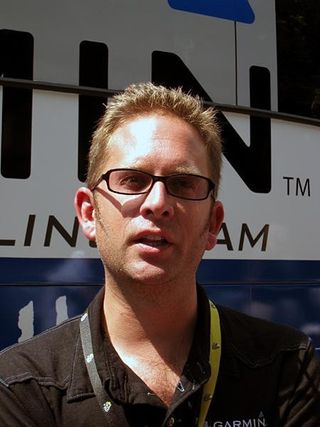Vaughters defends UCI's biological passport
Garmin-Slipstream director responds to Walsh's criticisms

Jonathan Vaughters has leapt to the defence of the UCI's biological passport, saying that clean riders can win the Tour de France.
The passport, the UCI's tool to monitor rider's blood profiles, was criticised by the Sunday Times' David Walsh, who told Cyclingnews, "The passport seemed like a good idea, but I don't believe that the system can catch the sophisticated cheater. The evidence we have so far is that the guys toward the winning end of the classification in big races are still significantly ahead of the UCI's checks."
However Vaughters, who has a strong anti-doping philosophy like Walsh, and whose Garmin Slipstream team placed two riders in this year's Tour de France top ten, believes criticism of the passport during its infancy is unwarranted. Instead, he pointed out that cycling is doing far more than any other sport to rid itself of cheats.
"I respect Walsh and his anti-doping stance. That being said, I don't like criticism of the biological passport. I understand that it isn't perfect, like any anti-doping technology, but it is the best technology that we've got right now, and I think it's something that the sport should be immensely proud of. No one has done this before and we're pushing the boundaries to the far edge. We've got to be proud of that."
"David used to tell me that the tragedy of doping is a rider like Christophe Bassons, who is absolutely intent on riding clean, isn't able to succeed in the sport. I agreed with him, wholeheartedly. However, from my viewpoint, clean riders are succeeding in the peloton. Christophe Bassons could succeed in the peloton. To me there's no reason that in this day and age with the biological passport in place that a clean rider can't be successful at the highest level," Vaughters added.
Walsh had previously pointed to Antoine Varey, a former coach for Festina, who now analyses riders' performances on the major climbs as evidence that the sport was still short of catching doping. However Vaughters, who once held the record for the ascent of Mont Ventoux, disagreed with Varey's results. "Firstly, if you do a direct comparison with VAM from 2009 to 1996, and you're comparing Hautacam or Alpe d'heuz with Verbier, well that's just not a fair comparison. Alpe d'Huez is about a 40-minute climb while Verbier is around half of that so the biggest error in the calculation that he's making is that the component of anaerobic work done in a 20-minute period is 30 to 40 percent larger than the component of anaerobic work done in a 40-minute period. It's flawed from a scientific perspective."
Vaugthers also pointed out factors such as rolling resistance and bike mass altering from the mid 90s to the present day, as well as the high-tech fibers within clothing, lighter components and that bikes are now on the limit of the UCI's weight minimum regulations of 6.8kg. "In the mid-90s bikes were 9kg, you had these heavy Carnac shoes that Pantani used to wear, and the clothing held more sweat, so four kilograms per watt for a rider like Pantani who only weighed 55kg is around seven percent, which would have had a massive effect on his ascent velocity."
Get The Leadout Newsletter
The latest race content, interviews, features, reviews and expert buying guides, direct to your inbox!
"Then there are the tiny details like wheels being more aerodynamic, ceramic bearings, and so on..."
"Point being, from a physiological and technical standpoint it's just inaccurate and it's not fair to the biological passport to be making that assumption."
Like Walsh, Vaughters had no proof as to whether the competition at this year's Tour was fairer, despite less positive tests to date. "Do I know that no one doped in this year's Tour? Absolutely not. From my first hand information on someone like Bradley Wiggins, I can ascertain that the Tour de France can be won clean. Period. Any race in the world can be won clean. Whether they are (riding clean) or not, I don't know, but it's well within the realms of possibility."
Follow Cyclingnews on Twitter for the very latest coverage of events taking place in the cycling world - twitter.com/cyclingnewsfeed
Daniel Benson was the Editor in Chief at Cyclingnews.com between 2008 and 2022. Based in the UK, he joined the Cyclingnews team in 2008 as the site's first UK-based Managing Editor. In that time, he reported on over a dozen editions of the Tour de France, several World Championships, the Tour Down Under, Spring Classics, and the London 2012 Olympic Games. With the help of the excellent editorial team, he ran the coverage on Cyclingnews and has interviewed leading figures in the sport including UCI Presidents and Tour de France winners.
Most Popular



